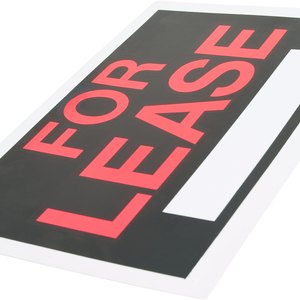
Unfortunately, breaking a lease comes with penalties in Colorado, as in other states; unless you have a valid legal reason to do so. If you've signed a lease for a specified amount of time, and you want to get out of it early, you're only options are to negotiate with your landlord, or to find a valid reason to break it.
Communicate directly with your landlord. Some landlords are open to negotiation if you explain your situation, and if you're circumstances are such that staying in your rented space would create a personal hardship. You might be able to get your landlord to let you out of the lease; however, your landlord might demand the right to keep your security deposit.
Analyze your lease. If there's something in your lease your landlord promised to provide, but hasn't, you might have a valid reason to break the lease without incurring penalties. For example, if your lease states that your apartment includes a working washer and dryer, but it doesn't, you might be able to break your lease without incurring penalties.
Know your rights as a tenant in Colorado. In Colorado, leases include implied promises. These are promises that aren't explicitly stated in the lease, but implied by law. For example, landlords are required to ensure you have adequate running hot and cold water. Additionally, it's implied that a landlord will fix broken appliances when given proper notice. Any breach of these implied promises might provide legal grounds for breaking your lease.
Sublet your leased space. If all else fails, and your lease allows it, you can sublet your rental to someone else until the lease is up. If you sublet your rented space, you're responsible if the person who is subletting fails to pay rent. You can instead assign your lease to another party, which ensures you're not liable for any unpaid rent or damages.
Contact a tenant's' rights organization in your area. Tenant's right's organizations can provide you information about your rights and liabilities once you've explained the details specific to your situation.
Warnings
It's important that you communicate with your landlord about your desire the break your lease. If you simply move out without any warning, your landlord can sue you in small claims court for the rent you would otherwise have paid if you'd stayed including additional costs.
References
- Apartment Ratings; How To Break a Lease; November 2005
- Georgia Consumer Protection Division. "If I Terminate My Lease Early, Can My Landlord Keep My Security Deposit and Charge Me a Fee?" Accessed April 6, 2020.
- Oregon State Bar. "Fees and Deposits." Accessed April 6, 2020.
- Wisconsin State Legislature. "704.29 Recovery of Rent and Damages by Landlord; Mitigation." Accessed April 6, 2020.
- The Judicial Branch of California. "Security Deposits." Accessed April 6, 2020.
- Updater. "Breaking a Lease: Everything to Know." Accessed April 6, 2020.
- New Jersey Department of Community Affairs. "Lease Information Bulletin," Page 3. Accessed April 6, 2020.
- Consumer Financial Protection Bureau. "Could Late Rent Payments or Problems With a Landlord Be in My Credit Report?" Accessed April 6, 2020.
- Experian. "Does Breaking a Lease Affect Your Credit?" Accessed April 6, 2020.
- Experian. "How Long Does It Take for Information to Come Off Your Credit Reports?" Accessed April 6, 2020.
- New Jersey Department of Community Affairs. "Lease Information Bulletin," Page 2. Accessed April 6, 2020.
- Michigan Department of Attorney General. "Other Legal Protections and Rights Provided By State And Federal Law." Accessed Apr. 23, 2020.
Warnings
- It's important that you communicate with your landlord about your desire the break your lease. If you simply move out without any warning, your landlord can sue you in small claims court for the rent you would otherwise have paid if you'd stayed including additional costs.
Writer Bio
Ellis Roanhorse has been writing professionally since 2007. His work has been published in the "Loyola Law Review," "The Portland Mercury" and "Carillon Magazine." Roanhorse holds a Master of Arts in political science from the University of Chicago and a Juris Doctor from the Loyola Marymount School of Law.

